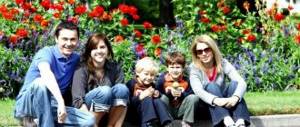Lesson “Introduction to the world of psychology”
Engaging in extracurricular activities
INTRODUCTION TO THE WORLD OF PSYCHOLOGY
A conversation about what psychology is and why a person needs it
What is psychology? This is the science of the soul.
The presenter writes down all the words on a Whatman paper mounted on the board.
What does psychology study? (Thoughts and feelings of people.)
Who is a “psychologist”?
Imagine that you are walking along the road and feel that a pebble has hit your shoe. What will you do? Of course, you will stop, take out a pebble, throw it on the path and calmly move on. If you continue on your way, not paying attention to the pebble, then it will interfere with you more and more. Also, the problem inside you will bother you until you talk about it.
A psychologist is the person who will help you solve the problem and move on calmly.
Why is it necessary to know psychology? (In order to understand yourself and other people, to be able to live amicably and cheerfully.)
Welcome ritual.
Instructions: I want to talk to you about how people usually greet each other. How many of you can demonstrate a typical Russian handshake? I would like you to come up with a funny greeting now that we will use in the near future. This handshake should become a kind of distinction for our group. First, choose your partner. You are given three minutes to invent the most unusual way of shaking hands. This greeting should be simple enough that everyone can easily remember it, but funny enough that we will have fun shaking hands that way. Now let each couple show the greeting they created. We need to choose the handshake that we will use with you at our next meeting.
Rules of behavior in the classroom.
The presenter says that these rules apply to all participants. After reading each rule, a discussion follows: - how do you understand this rule? - are you ready to follow it? 1) The rule of everyone’s activity and responsibility. 2) The rule of group closure, i.e. what happens in the group is not discussed outside of it. Don’t tell others what we learn about each other in class and how different kids behave in them. 3) Rule of responsibility and sincerity: you need to try to be yourself, say what you think and feel. 4) Do not evaluate the behavior of group members unless they themselves ask for it.
5) “Stop” rule: a group member who does not want to answer a question or participate in the game can say “Stop,” but it is advisable to use it as little as possible.
Next, the presenter “solemnly promises to follow all the rules” and invites the children to do the same.
Literation of the name.
Each participant says his name with a letter. (For example: affectionate Lena, sweet Masha, etc.).
"Tender name"
The presenter talks about how in psychology classes children will try to call each other affectionately. Offers to come up with affectionate names for each participant.
"Self-Portrait"
Participants imagine that each of them became a famous navigator or doctor, scientist or writer. And already during his lifetime it was decided to erect a monument on which his name should be written and interesting drawings drawn. Children come up with pictures for their names, describe them verbally, and then draw them in albums next to the beautifully written name.
Reflection:
Assessment using 10 fingers: interest in the lesson, desire to attend next time.
Work program in psychology for 10th grade students
Purpose of the program:
Training in the “Fundamentals of Psychology” program provides an opportunity for self-development as a continuous process, within which the student acquires the ability to manage current events, form good and open relationships with other people, consistently defend his views, express his point of view and lead a discussion. During classes in the “Fundamentals of Psychology” program, students will be able to identify their strengths and weaknesses, inclinations and capabilities, which will help them become competent and worthy members of society. The age of students in grades 10-11 is favorable for completing the development of psychological readiness for self-determination - personal, professional , vital. It is during this period that moral values and life prospects are consciously formed, there is an awareness of oneself, one’s capabilities, abilities, interests, the desire to feel oneself and become an adult, the desire to communicate with peers, within which common views on life, on relationships between people are formed, for their future, personal meanings of life are formed. Therefore, educational work in psychology with them focuses on developing their understanding of their calling, the ability to see the meaning of life, time perspectives and emotional attachments, professional choice and future family life. The purpose of teaching psychology at school is to: increase students' competencies (personal, social, communicative).
Target
is implemented through the solution of psychological and pedagogical tasks that ensure the development of the student’s personality:
• formation of students’ general ideas about psychology as a science; • assisting them in discovering the inner world of a person, awakening interest in other people and in oneself; • development of the intellectual sphere (general and special abilities, cognitive orientation, etc.); • development of self-awareness (self-esteem, adequate self-esteem); • revealing the essence of personal orientation (needs, desires, goals, meanings, ideals, value orientations); • development of the emotional sphere (feelings, experiences, moods, etc.), understanding the feelings and experiences of other people; • detecting and overcoming negative manifestations in the habits and behavior of students. • nurturing in students an emotional and value-based attitude towards people, development, activity, creativity, psychological culture, cognition, health,
Item specifics:
Teaching psychology involves the collaboration of high school students with a teacher-psychologist in the space of problems of self-awareness, personal self-realization and self-regulation, intellectual and personal reflection. A psychology lesson is subject, on the one hand, to the general didactic laws of conducting a lesson, on the other hand, it has its own specific features in content accents and methods of delivery. Students in the lesson learn not only about human psychology in general, but also have the opportunity to learn about themselves, the patterns, mechanisms, essence and conditions of personality development.
Technologies, methods:
- problem-based learning;
- information and communication technologies;
- health-saving technologies;
- collective way of learning (work in pairs and groups).
Key ideas of the course.
1. Each person has unconditional value and is a unique individual. 2. The main role in the development of personality is played by its own activity. 3. The goal of human development is a harmonious personality. 4. The goal of development is achievable through self-knowledge and self-improvement.
Monitoring the study of the course involves students completing two test papers.
The correct answers are communicated to students and based on this they have the opportunity to evaluate themselves. In addition, students will perform a number of creative works, the results of which are discussed in groups. Thus, control is focused on self- and mutual control. For the full text of the material Work program on psychology for 10th grade students, see the downloadable file
. The page contains a fragment.
| Author: Gabidullina Gulshat Ilgizovna → Guli 10/11/2010 4 20630 3349 | Comment |
Thank you for your mark. If you want your name to be known to the author, log in to the site as a user and click Thank you again. Your name will appear on this page.
Login | Registration
Have an opinion? Leave a comment
Psychologist - lessons, tests, presentations, notes
Create your teacher website PC and PPC courses Video lessons Olympiad Webinars for teachers
- home
- Psychologist
Watch and download free lessons, tests, notes, presentations and other useful materials for a psychologist.
- All 5889
- Lessons 1131
- Presentations 827
- Tests 164
- Planning 338
- Events 1054
- Other 2375
- All classes
- For preschoolers
- 1 class
- 2nd grade
- 3rd grade
- 4th grade
- 5th grade
- 6th grade
- 7th grade
- 8th grade
- 9th grade
- Grade 10
- Grade 11
| The structure of a comprehensive correctional and preventive program for supporting children with signs of giftedness Working with gifted children requires high professionalism and energy expenditure from the teacher. The support system is aimed at developing psychological knowledge for teachers and parents in… 05/14/2020 Vera Aleksandrovna Golkina 93 1 |
| “Interaction between family and school: diagnostic aspect” It is no secret that the activities of the school are many times greater than the intensity of the activities of the family. But it cannot be otherwise, since teachers are specialists in the field of education... 08/31/2020 Tishina Galina Aleksandrovna 35 0 |
| About people with disabilities This presentation is dedicated to people with disabilities. Promotes the development of tolerance among high school students.... 07/30/2020 Khapeishvili Sofia Tengizovna 73 2 |
| Memo for parents. “Cruel treatment” Memo for parents. "Cruel treatment"… 07/28/2020 Tsutskiridze Ketevan Georgievna 76 0 |
“Sardorlar oʻrtasidagi munosabat” mavzusida Yoshlar ittifoqi sardori haqida maʼlumot berish… 04/05/2020 Uchqunov Ravshanbek Uchqun oʼgʻli 98 0 |
Unlocking hidden resources in athletes Unlocking resources in children when playing sports... 07/28/2020 Tsutskiridze Ketevan Georgievna 43 0 |
| Zhasospіrіmnіn mіnesіndegi erekshelikter Help from the teacher to students and parents Ata — analar men okushylarga arnalgan zhadynam… 06.24.2020 Akimzhanova Arailym Kenzhebaevna 74 0 |
| Working with clay is a way to relieve aggression. This development is designed to relieve aggression in children in an environmentally friendly way. ... 04/22/2020 Yulia Evgenievna Merzlikina 97 2 |
| Children's theft. Causes and prevention Child theft is one of the most serious problems. It worries and frightens parents and teachers. And this is not surprising, because each of us dreams that life... 07/23/2020 Simonova Veronika Mikhailovna 52 0 |
| Professional Ethics of a Hairdresser This presentation is recommended for college students majoring in hairdressing. Ethical behavior of a specialist is recommended... 09.12.2020 Aldashova Elvira Sharibekovna 37 0 |
| “Bullying zhane onyn aldyn alu zholdary” Mektebimizde zorlyk-zombylyktyn aldyn-aluda bullying maselesimen talaptarga sai zhumystar zhurgizilude (sonny ishinde bullying ballalarmen zhane bullying kurban Daryman) Bullying... 04/08/2020 Dyusebekova Kymbat Ayipovna 97 0 |
| “Art therapy in working with children with disabilities” It can be assumed that the inner world of a child with certain developmental disabilities is even more complex due to the problems he has... 08/21/2020 Raspopova Olga Sergeevna 58 1 |
| “Zhagymdy karym-katynas” mugalimderge arnalgan psychology training - about the process of profit of psycho-emotional kysymdy tusiru; — әr ұstazdyn zhekelik ereksheligin eskerip, okushy men teacher arasynda izgilik karym — katynasty kalyptastyru; - adamdy oz - ... 10/08/2020 Imash Aykanbek Aytanuly 6 0 |
| Psychological training “Lies and Truth” / Identify problems associated with drug addiction and prevent the first use of drugs…. 10/09/2020 Zotova Tatyana Vladimirovna 3 0 |
| Psychological game Let's say NO to drugs Identify problems associated with drug addiction and prevent the first... 10/09/2020 Zotova Tatyana Vladimirovna 3 0 |
| “Biz Birgemiz” psychology training Bul training pedagogy uzhymdy yntymaktastyruga, karym-katynas dagdysyn damytuga, oz-ozine degen senimdiligin, zhagymdy katynasty arttyru Yes, konil-kuylerin koteruge bagyttalgan. Jattygular training… 10/08/2020 Imash Aykanbek Aytanuly 5 0 |
| Together we are stronger Use of narcotic drugs and other psychoactive substances…. 10/09/2020 Zotova Tatyana Vladimirovna 3 0 |
| “GENERATION ALPHA” are such different children. This article introduces the characteristics of generation A, behavioral characteristics, educational process... 09/26/2020 Boretskaya Kristina Aleksandrovna 15 0 |
| Webinar “Quarantine without stress” Ukraine in quarantine. Many families have experienced isolation at home and this is not just psychological testing. Like this hour vikorystati z koristyu. You can see not the deprivation, but... 06/03/2020 Savchenko Viktoria Mykhailivna 76 0 |
| “Conflicts: types, solutions” The outline of the lesson “Conflicts, types, solutions” is intended for students 10-18 years old... 09.26.2020 Boretskaya Kristina Aleksandrovna 17 0 |
- ← Back
- Continue →


